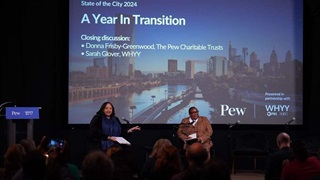Pew: WTO Misses Opportunity This Year to Reduce Harmful Fisheries Subsidies
Despite missing deadline, WTO made significant progress and should aim to reach deal in 2021
GENEVA—The Pew Charitable Trusts expressed disappointment Monday that World Trade Organization members failed to meet the United Nations’ 2020 deadline for reaching an agreement to end harmful fisheries subsidies, but noted that countries made significant progress during the negotiations—paving the way for a deal in 2021.
The chair of the negotiations, Ambassador Santiago Wills of Colombia, announced Monday that countries will need to continue negotiating in the new year. Although negotiators have been meeting full time since September, they have not yet coalesced around a stabilized text—a version of an agreement with which most countries generally concur. A 2021 work plan is under development.
Governments hand out $22 billion a year in damaging subsidies to primarily large, industrial fishing fleets to help cover costs such as fuel and vessel construction, enabling them to catch more fish than is sustainable by fishing farther out to sea and for longer periods.
Five years ago, 193 countries adopted the U.N.’s Sustainable Development Goals; Goal 14 called for conserving and responsibly using the ocean and marine resources, with nations agreeing to effectively regulate fisheries, eliminate illegal fishing, and, by the end of 2020, halt subsidies that fund destructive fishing practices.
Isabel Jarrett, manager of The Pew Charitable Trusts’ project to end harmful fisheries subsidies, issued the following statement:
“World Trade Organization members have made tremendous progress toward reaching an agreement to end harmful fisheries subsidies. Although they fell short of meeting the Sustainable Development Goals’ 2020 deadline for a fisheries subsidies agreement, negotiators must maintain momentum and focus on achieving this goal as soon as possible.
“It will be important for WTO members to ensure that the text of a fisheries subsidies agreement does not include loopholes that would undermine its conservation goals and allow the status quo to continue. For instance, any flexibilities granted must be restricted to helping developing nations transition away from their harmful fishing subsidies and must be time limited, covering a finite period. Developed nations should not be granted exceptions that allow them to continue providing destructive fishing subsidies even if they’ve put management measures in place.
“For decades, irresponsible practices have depleted fish populations and damaged economies and ecosystems. Because destructive subsidies are a key driver of overfishing, ending these subsidies is one tangible way to help ensure sustainable fisheries. Now, the WTO is poised to reach an agreement that would do just that. Even in a political environment that makes it tough to get things done—and despite a global pandemic that caused unforeseen delays in the negotiations process—WTO members have made significant strides. If countries reach an agreement on harmful fishing subsidies that keeps loopholes to a minimum, they will achieve a conservation victory that could have a long-lasting, positive impact on our global ocean.”
The Pew Charitable Trusts is driven by the power of knowledge to solve today’s most challenging problems. Learn more at www.pewtrusts.org.
Spotlight on Mental Health
MORE FROM PEW
Explore Pew’s new and improved
Fiscal 50 interactive
Your state's stats are more accessible than ever with our new and improved Fiscal 50 interactive:
- Maps, trends, and customizable charts
- 50-state rankings
- Analysis of what it all means
- Shareable graphics and downloadable data
- Proven fiscal policy strategies
Welcome to the new Fiscal 50
Key changes include:
- State pages that help you keep track of trends in your home state and provide national and regional context.
- Interactive indicator pages with highly customizable and shareable data visualizations.
- A Budget Threads feature that offers Pew’s read on the latest state fiscal news.











